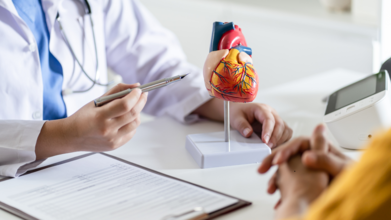- Health Conditions A-Z
- Health & Wellness
- Nutrition
- Fitness
- Health News
- Ayurveda
- Videos
- Medicine A-Z
- Parenting
- Web Stories
5 Warning Signs Of Heart Attack You Should Not Ignore, According To Top US Cardiologists

Credits: Canva
Most of us imagine a heart attack as someone clutching their chest and collapsing. In reality, the symptoms can be far stranger and more subtle, and many people don’t recognize them until it’s almost too late.
Heart Attacks Don’t Always Look the Same
Heart attacks occur when blood flow to the heart stops or slows, often because a plaque rupture causes a clot that blocks a coronary artery, cardiologists explain. While the classic symptom is a tight, squeezing or aching chest pain, the experience isn’t always that straightforward.
William Brady, professor of emergency and cardiovascular medicine at the University of Virginia School of Medicine, tells the Washington Post that the “vast majority of people” with heart attacks will feel that familiar chest pain. But others feel symptoms that don’t fit the Hollywood version at all, which can be dangerous, because it causes people to delay treatment.
Women Are More Likely to Dismiss the Signs
Experts say women are particularly at risk of ignoring symptoms or having them dismissed by others. Stacey Rosen, volunteer president of the American Heart Association and executive director at Northwell’s Katz Institute for Women’s Health, told the Post that women often report symptoms differently. They may feel pain along with back aches, nausea or dizziness, and instead of calling it chest pain, they might describe it as “pressure,” “discomfort” or just “feeling off.”
“Delay can lead to irreversible heart damage,” Rosen warned. “So, really, listen to your body.”
The 5 Warning Signs Cardiologists Want You to Know
Cardiologists shared five surprising signs that could mean you are having a heart attack, even if you don’t have dramatic chest pain.
Also Read: The Bizarre Foot Test That Could Point Towards A Heart Failure
1. Jaw Pain
James de Lemos, chair of cardiology at UT Southwestern Medical Center, told the Post, the aching pain from a heart attack can radiate to other parts of the body, sometimes just the forearm or jaw. The symptoms can be subtle and much less dramatic than TV shows portray.
Rosen shared that she once saw a patient who kept visiting dentists for persistent jaw pain — until one dentist suggested it could be heart-related. “And, in fact, it was,” Rosen said. Acting quickly probably prevented a full-blown heart attack.
2. Nausea and Vomiting
Indigestion, reflux, or even vomiting can sometimes signal a heart attack, particularly when the lower portion of the heart is involved, de Lemos said. If your “stomach issue” doesn’t improve with antacids, experts recommend seeking medical care, especially if you have risk factors for heart disease.
3. A Sense of Impending Doom
Several cardiologists said patients sometimes describe a sudden and overwhelming feeling that something is very wrong, even that they might die. “It can be just this awareness, just a sense that something doesn’t feel right,” said Clyde Yancy, chief of cardiology at the Northwestern University Feinberg School of Medicine, as reported in the Post. That feeling alone, especially if paired with physical symptoms, is enough reason to get evaluated.
4. Sweaty, Cold and Clammy Skin
A blockage in a coronary artery puts extreme stress on the body, activating the sympathetic nervous system, Rosen said. That can leave someone suddenly sweaty, clammy and pale, even if they aren’t doing anything strenuous. Brady added that if you feel chest tightness, shortness of breath, and sweating while doing something as routine as carrying groceries, it’s time to get help.
5. Fatigue
Seth Martin, a cardiologist at Johns Hopkins Medicine, explained that heart attacks limit the oxygen supply to the heart and the body, leaving people feeling unusually tired, foggy or short of breath. Anna Bortnick, an interventional cardiologist at Montefiore Einstein Medical Center, noted that many people delay going to the hospital because they blame it on stress or aging.
Sometimes, these symptoms come in waves for days before a major event. “It’s really a dynamic process for many,” Rosen said.
You can’t replace heart muscle once it’s damaged, which is why early treatment is critical. Cardiologists recommend focusing on prevention: keep blood pressure and cholesterol under control, exercise at least 150 minutes a week, avoid smoking, limit alcohol, and eat a heart-healthy diet.
Is Your Mindset Making You Sick? Study Finds Negative Thinking Harms Elderly Health

(Credit- Canva)
As kids we were often encouraged to think positively and not let negative thoughts derail our mind. Letting negative thoughts remain too long in your head can make you feel fatigued and unable to do necessary tasks as well. However, how much of this is actually psychological?
Can you imagine having pain in your body, but there is no ailment that can fix it? Is it completely psychological? What many people do not know about mental health is that it can severely impact your bodily health as well. To put this to test, researchers in China looked into how this could affect the elderly population of China.
In a study published in June 2025, researchers noted that the population is getting older, and with that comes a big increase in cognitive problems in older adults. These issues range from simple age-related memory loss to more serious conditions like dementia. This isn't just a personal health issue; it affects families and society as a whole.
Is Cognitive Health Declining Faster?
According to the study, globally, about 55 million people have dementia, and that number is expected to jump to 139 million by 2050. In China, 6% of people over 60 have dementia, and 15.5% have mild cognitive impairment (MCI). The total cost of caring for people with dementia in China could reach $1.89 trillion by 2050. Since there's no cure for dementia, it’s vital to find ways to prevent or delay its progress.
As people get older, their physical health declines, and so can their mental health. Anxiety and depression are very common, with over 20% of older Chinese adults experiencing symptoms. These mental health issues are a known risk factor for cognitive decline, but researchers are still trying to figure out exactly how they are connected.
Can Poor Mental Health Cause Decline In Memories?
To understand this, researchers looked into RNT. Repetitive Negative Thinking (RNT) is a pattern of stuck, negative thoughts that are hard to control. It includes two common habits: rumination, which is constantly replaying bad things from the past, and worry, which is focusing on future problems. Since RNT is a key symptom of many mental health issues like anxiety and depression, researchers think it might be a major reason why these issues are linked to a higher risk of dementia. This makes RNT a promising target for preventing cognitive decline.
Do Elderly People Have Negative Thoughts?
A study was conducted with 424 older adults in Wuhan, China, to see if there was a connection between RNT and their cognitive function, which includes skills like memory and attention.
Researchers used a survey called the Perseverative Thinking Questionnaire (PTQ) to measure RNT. A higher score meant a person engaged in more negative thinking. To check cognitive function, they used the Montreal Cognitive Assessment (MoCA) Test. A higher MoCA score meant better mental skills. The study also considered other factors like age, education, and health to ensure the results were accurate.
The results showed a clear negative link: people who had more RNT had lower cognitive scores. This connection was strong even after accounting for other factors like a person's age or how much education they had.
RNT appeared to affect most mental skills, like the ability to think and remember, but it didn't seem to affect language skills. The link was strongest in adults aged 60-79 and those who had at least a junior high school education. For people over 80 or those with very little education, the connection wasn't as noticeable.
How Can We Tackle Negative Thoughts In Elderly?
This study suggests that constantly dwelling on negative thoughts can wear out the brain, leading to a decline in memory and other mental abilities. The stress from RNT might actually change the brain's structure and function.
These findings suggest that checking older adults for RNT should become a part of health screenings. By identifying and helping people manage their negative thoughts early on, it may be possible to lower their risk of cognitive decline.
Every Year, They Return To Lake Minnetonka: Four Survivors Who Beat Cancer And Celebrate Life

Credits: Canva
"Social support is regarded as a complex construct, which has long been suggested to have direct and buffering effects on patients' wellbeing and emotional adjustment to cancer." This is part of the abstract of a 2012 study published in the Asian Pacific Journal of Cancer Prevention. True to this, a group of four, now make it a point to commemorate their win against cancer, every year.
Sandy Robertson, Terri Naab, Shari Hamlin, and Pricilla Bauer, all met each other at an oncology ward of the Methodist Hospital. They became each other's support system, fighting the same battle - breast cancer. They call their group the R-Gang. Why? If one takes a guess, the 'R' here stands for radiation, a therapy recommended to cancer patients. The R-Gang has all sorts of conversations, sometimes light and sometimes heavy.
The CBS reports that now, after successfully defeating cancer, the four meet on the 'shores of Lake Minnetonka at Maynard's, travelling across the country to commemorate each year they are still alive'.
Also Read: West Nile Virus Isn't Over Yet, New Cases In US On Rise
"I Will Never Let Go Of These Girls'
Bauer told CBS News that she was told that she had 60% chances of dying. "They said, '60/40, 60 you are gonna die'." She continues, "We were all sitting next to each other in that radiation room. At first, we were just polite to each other and we all just started talking."
"After the whole breast cancer diagnosis, I said, 'What am I doing in sales? I need to write.' And so I quit sales job and started writing." Bauer told CBS News.
Earlier, a group of seven, out of whom, two - Judy and Shirley, died of other illnesses, and Sherry, the youngest died of cancer; now the group of four celebrate their lives, for as long as they can.
Their friendship is special. "Even though it was tragic and horrible, it was one of the best times in my life because I met these people," said Naab. Hamlin seconded and said, "I will never let go of these girls. No, there's just no way."
All four are now cancer free, and will reunite at Maynard's the next year.
Cancer And Social Interaction
A 2017 study published by the Cambridge University Press noted that social interaction could have positive effect on a person's chance of survival after being treated for cancer. The author of the study Jeff Leinert and colleagues accessed the medical records of 4,691 cancer patients who were undergoing chemotherapy treatment in medical facilities in Oxfordshire, UK. The researchers found that being in the company of, and interacting with patients who survived cancer for at least 5 years after completing the treatment led to an increase in survival rate.
The 2012 study from Asian Pacific Journal of Cancer Prevention also noted that cross-sectional and prospective studies show a positive association between perceived social support and psychological adjustment following cancer treatment. Research also suggested a strong evidence for relationship between social support and improvement in cancer patients. The importance of social groups and social support for cancer patients were also pointed out by Dr Mrinal Gounder, while he spoke on Sarcoma Awareness in an exclusive interview with Health and Me.
Cardiologist Warns: This 1 Daily Habit Could Be Destroying Your Heart Health

(Credit- Canva)
Sometimes when you have a hectic schedule, whether it is due to your work or your school assignments, all you need is that one energy booster to get through the day. For many young adults this boost happens to be energy drinks. According to UCLA health, 30% adolescents in US and 70% in Europe report drinking energy drinks. However, this simple habit could put your heart into failure, according to this doctor.
A cardiologist known as "Heart Transplant Doc" on social media, Dr. Dmitry Yaranov, is warning young, healthy people about the dangers of energy drinks. In a recent post, he highlighted a worrying trend he's seeing in his clinic: young adults in their 20s and 30s suddenly developing heart failure. The common link among these patients, who have no history of smoking or heart disease in their families, is that they consume three to four energy drinks a day. Dr. Yaranov calls this phenomenon "Energy Drink Heart."
What Are The Hidden Dangers of Energy Drinks
Dr. Yaranov explained that the high levels of caffeine and other stimulants in energy drinks can push the heart into overdrive. He warned that this can trigger abnormal heart rhythms, raise a person's blood pressure, and, over time, weaken the heart muscle. The scary part, he says, is that many of these patients felt perfectly fine until they suddenly weren't. Another cardiologist, Dr. Sanjeeva Kumar Gupta, agrees, noting that while the mental boost from these drinks is temporary, the physical stress on the heart can be lasting.
Is Caffeine Safe for Teens?
According to UCLA Health, the recommended daily caffeine limit for teens between ages 12 and 18 is less than 100 mg per day. To put that in perspective, a single energy drink can contain anywhere from 100 to 200 mg of caffeine per serving. The combination of high caffeine and sugar in these drinks can create a powerful and risky "jolt" of energy. This can lead to a racing heart, higher blood pressure, jitters, and a quick energy crash.
Ways Energy Drinks Can Be a Problem
Over time, drinking too many energy drinks can cause a dependence on that energy boost. When a teen tries to stop, they might experience withdrawal symptoms like headaches or a bad mood. The effects can be even more severe for teens who already struggle with mental health issues. While a cup of coffee has about 75 mg of caffeine, a single energy drink can have as much as three to four cups' worth.
Both doctors emphasize that people need to be aware of the serious risks of drinking too many energy drinks. The heart is not designed to run at maximum speed every day. Instead of relying on these drinks, they suggest choosing healthier ways to stay hydrated and energized, such as drinking water or natural juices. They stress the importance of reading labels and staying informed to protect both your heart and mind.
What is a Healthier Ways to Get Energy
The quick energy from these drinks is not a long-term solution. A well-balanced diet is a much better and more sustainable way to get energy. If you or your teen need caffeine, healthier choices include natural sources like plain tea or coffee without any added sugar. While these can have health benefits for adults, experts say there isn't enough research yet to confirm their effects on younger people.
© 2024 Bennett, Coleman & Company Limited

